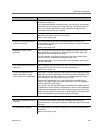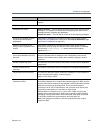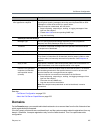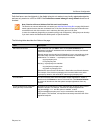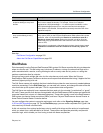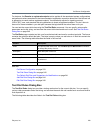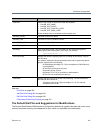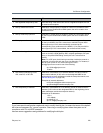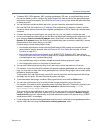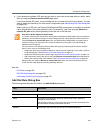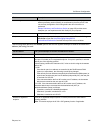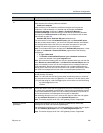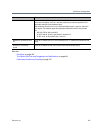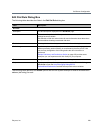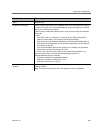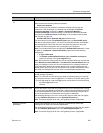
Call Server Configuration
Polycom, Inc. 243
● To add an MCU, ISDN gateway, SBC, neighbor gatekeeper, SIP peer, or simplified dialing service
that can be dialed by prefix, configure the prefix range of the new service on the appropriate page.
No dial plan change is necessary, since Rule Dial services by prefix of the default dial plan takes care
of dialing by prefix.
● You can remove or disable a default dial rule if you don't want the associated functionality.
But note that Rule Dial endpoints by IP address (Dial endpoints by IP address) is used in several
scenarios where calls are received from neighbor gatekeepers or SBCs. Removing it breaks these
scenarios.
● If certain dial strings are matching on the wrong dial rule, you may need to re-order the rules.
● In some circumstances (depending on the dial plan and the network topology and configuration), dial
rules using the Resolve to external address action (like Rule 5 of the default dial plan) or the
Resolve to IP address action (like Rule 6) can enable dialing loops to develop, especially if servers
reference each other either directly or via DNS.
Common ways to avoid dialing loops include:
Use domain restrictions to ensure that the RealPresence DMA system and its peers are each
responsible for specific domains (see Add External SIP Peer Dialog Box on page 105 and
Domains on page 237).
Use a preliminary script like the sample script “SUBSTITUTE DOMAIN (SIP)” (see Sample
Preliminary and Postliminary Scripts on page 255) to change the domain of a SIP URI dial string
to something that won’t create a dialing loop.
Use a postliminary script to similarly change the domain before sending to a peer.
Use configuration options on the peers to prevent loops.
● You can add a filtering preliminary script to any dial rule to restrict the behavior of that rule.
For example, if you know that all the aliases of a specific neighbor gatekeeper are exactly ten digits
long, you may want to route calls to that gatekeeper only if the dial string begins with a certain prefix
followed by exactly ten digits.
To accomplish this, add a preliminary script to the service prefix dial rule that rejects all dial strings
that begin with the prefix, but aren’t followed by exactly ten digits.
● To exclude certain dial strings, combine a filtering preliminary script with the Block action.
● You can use a preliminary script to modify the dial strings accepted by any of the rules.
For example, to be able to call an enterprise partner by dialing the prefix 7 followed by an alias in the
partner’s namespace, configure a Resolve to external at transforms the string 7xxxx to
H323:xxxx@enterprisepartner.com.
This type of dial string modification is also useful if you are using Lync conference dial strings with
prefixes. To route a dial string with a prefix to a Lync conference ID, configure a Resolve to Lync
conference ID action with a preliminary script that removes the prefix from the dial string (1234567
would become 4567, for example).
● If your enterprise includes another gatekeeper and you want to route calls to that gatekeeper without
a prefix, add a dial rule using the Resolve to external gatekeeper action.



